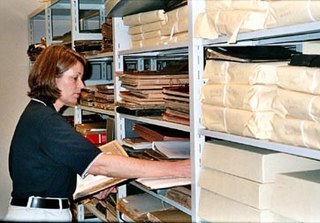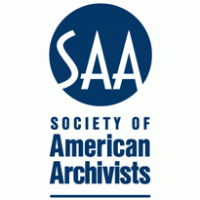Related Research Articles

An archivist is an information professional who assesses, collects, organizes, preserves, maintains control over, and provides access to records and archives determined to have long-term value. The records maintained by an archivist can consist of a variety of forms, including letters, diaries, logs, other personal documents, government documents, sound or picture recordings, digital files, or other physical objects.

The Society of American Archivists is the oldest and largest archivist association in North America, serving the educational and informational needs of more than 5,000 individual archivist and institutional members. Established in 1936, the organization serves upwards of 6,200 individual and member institutions.

Trudy Huskamp Peterson is the first woman to hold the position of Archivist of the United States. She was the Acting Archivist of the United States from March 25, 1993 to May 29, 1995.

Archival science, or archival studies, is the study and theory of building and curating archives, which are collections of documents, recordings, photographs and various other materials in physical or digital formats.
A finding aid, in the context of archival science and archival research, is an organization tool, a document containing detailed and processed metadata and other information about a specific collection of records within an archive. Finding aids often consist of a documentary inventory and description of the materials, their source, and their structure. The finding aid for a fonds is usually compiled by the collection's entity of origin, provenance, or by an archivist during archival processing, and may be considered the archival science equivalent of a library catalog or a museum collection catalog. The finding aid serves the purpose of locating specific information within the collection. The finding aid can also help the archival repository manage their materials and resources.
In archival science and archive administration, appraisal is a process usually conducted by members of the record-holding institution in which a body of records is examined to determine its value for that institution. It also involves determining how long this value will last. The activity is one of the central tasks of an archivist, to determine the archival value of specific records. When it occurs prior to acquisition, the appraisal process involves assessing records for inclusion in the archives. In connection with an institution's collecting policy, appraisal "represents a doorway into the archives through which all records must pass". Some considerations when conducting appraisal include how to meet the record-granting body's organizational needs, how to uphold requirements of organizational accountability, and how to meet the expectations of the record-using community.
Shelley Sweeney is a Canadian archivist. She was university archivist at the University of Regina from 1983 to 1998, and the Head of the University of Manitoba Archives & Special Collections from 1998 to 2020. She helped found two regional archival organizations, the Saskatchewan Council of Archives and the Saskatchewan Archivists Society, and the University and Research Institutions section of the International Council on Archives. Sweeney is a charter member of the Academy of Certified Archivists and, with colleagues, wrote the first code of ethics for the Canadian archival profession.

Sir Charles Hilary Jenkinson was a British archivist and archival theorist, regarded as the figure most responsible for bringing continental European concepts of archival theory to the English-speaking world.
Respect des fonds, or le respect pour les fonds, is a principle in archival theory that proposes to group collections of archival records according to their fonds. It is one of several principles stemming from provenance that have guided archival arrangement and description from the late 19th century until the present day. It is similar to archival integrity, which dictates that "a body of records resulting from the same activity must be preserved as a group." It is also closely related to the idea of original order – the idea that archivists ought to maintain records using the creator's organizational system. However, respect des fonds differs from that other foundational sub-principle of provenance in its concern with the integrity of the collection or record group as a whole rather than the organization of materials within that collection or record group.

Theodore Roosevelt Schellenberg was an American archivist and archival theorist. Schellenberg's publications and ideas are part of the foundation for archival theory and practice in the United States. In particular, Schellenberg is known for pioneering American archival ideas about appraisal.
Helen Willa Samuels is an American archivist and scholar in archival studies. She is best known for her 1986 essay "Who Controls the Past", which introduced the concept of archival documentation strategy, and her 1992 book Varsity Letters: Documenting Modern Colleges and Universities.
The Midwest Archives Conference (MAC) is a regional archivist association serving the Midwestern region of the United States. MAC was founded in 1972 and held its first fall meeting in the Bismarck Hotel in Chicago, Illinois. While MAC has over 800 members from various states and countries, the MAC region is composed of Illinois, Indiana, Iowa, Kansas, Kentucky, Michigan, Minnesota, Missouri, Nebraska, North Dakota, South Dakota, Ohio, and Wisconsin. MAC holds annual conferences with roundtables, panels, and workshops targeted towards archivists, curators, and librarians. Conferences have addressed such topics as federal funding for archives, documenting social history through the records of various ethnic groups, conservation, and data reporting standards for archival institutions. Other presentations have discussed how an archives can tie into their parent institution's anniversaries and big events, or how to make popular music collections a part of your archives. Annual meetings include informational sessions and notable plenary speakers, such as Pulitzer Prize winning author Leon Dash, who spoke at the 2006 Annual Meeting in Bloomington, Illinois. Annual conferences also often include themes, such as "Documenting Rural America" (the theme of the 1986 conference held in Hudson, Wisconsin.
Barbara L. Craig is an archivist, archival educator and scholar. She has contributed to the scholarly literature of archival theory and professional practice in the areas of appraisal, the ethnographic study of practicing archivists and users of archives, and the history of archives in her study of the impact of technology on the record-keeping practices of the British Civil Service before 1960. She has an MA in history from McMaster University, a certificate in Principles and Administration of Archives from Library and Archives Canada, and a Certificate in Records Management from the Government of Ontario. In 1989 she completed a PhD in Archival Studies from the University of London. Her dissertation was titled "Hospital Records in London, England and the Province of Ontario, Canada, 1880 to 1950."
Wilda D. Logan is an American archivist who is most well-known as her work of almost 40 years in the archival profession including 33 years of federal service with the Records Management Training Program of the National Archives and Records Administration (NARA). She is a member of the Society of American Archivists (SAA), Mid-Atlantic Regional Archives Conference (MARAC), National Association of Government Archives and Records Administrators (NAGARA), and is a Certified Archivist with the Academy of Certified Archivists (ACA), where she served as a Regent from 1991–1994.
Kathleen D. Roe is an American archivist. She has recently retired from her position as Director of Archives and Records Management Operations at the New York State Archives. She managed the archives records management program and provided services to “63 state agencies and 4,300 local governments as well as the archival programs operating State Archives archival facility holding over 100,000 cubic feet of state government records.” She also overlooked several statewide programs that “provide training and advisory services to over 3,000 historical records programs.” She was the president of the Council of State Archivists and later chaired the Government Relations Committee and the Survey Management Team. Roe was the 70th president of the Society of American Archivists (SAA) from 2014–2015. She is currently traveling and speaking on archival processing and the importance of archives.
Karen L. Jefferson is an American archivist who serves as the Head of Archives and Special Collections at the Atlanta University Center. She has been a member of the Society of American Archivists for almost 40 years, serving on the Council from 1997-2000 and receiving the Fellows Award in 2004.
Diana Lachatanere is an American archivist. She retired from the Schomburg Center for Research in Black Culture at the New York Public Library in 2013, where she held the position of assistant director for Collections and Services from 1995 to 2013, and Curator of the Manuscripts, Archives and Rare Books Division from 1988 to 2013. She was also the Manager of the Scholars-in-Residence Program, 1990–2013.
Mark A. Greene (1958–2017) was an American archivist who served as the 63rd President of the Society of American Archivists (SAA). He was a leader and prominent author within the archives profession, and is well known for the development of the archival management principles in More Product, Less Process (MPLP) together with Dennis Meissner.
Anne Jervois Gilliland is an archivist, scholar, and professor in the field of archival studies. She is Associate Dean for Information Studies at the University of California, Los Angeles Graduate School of Education & Information Studies.
Ricardo L. Punzalan is a Filipino American archivist who is an Associate Professor of Information at the University of Michigan School of Information. He has shaped the fields of archival science, virtual reunification, repatriation, reparative description, and has studied the nature of collections in both museums and archives. He holds undergraduate and Masters degrees from the University of the Philippines and a doctorate in information science from the University of Michigan.
References
- ↑ A Decade of Sponsored Research: The Research Fellowship Program for Study of Modern Archives. Bentley Historical Library, University of Michigan. 1994.
- ↑ Boles, Frank; Young, Julia Marks (1991). Archival appraisal. New York: Neal-Schuman Publishers. ISBN 978-1-55570-064-5.
- 1 2 3 4 5 6 7 "Julia Marks Young Inducted as a Fellow of the Society of American Archivists" (PDF). Society of American Archivists. August 2011.
- ↑ "Museums, Libraries, Archives Forge Connections With First Responders". MPB — Mississippi Public Broadcasting. Retrieved 2020-04-24.
- 1 2 3 4 5 6 "Julia Young To Succeed Holmes" (PDF). Mississippi Department of Archives and History. August 2013.
- 1 2 "Trump's visit to Mississippi Civil Rights Museum underscores national tension". NBC News. Retrieved 2020-04-24.
- 1 2 "Editor Julia Marks Young | Society of American Archivists". www2.archivists.org. Retrieved 2020-04-24.
- ↑ "Julia Marks Young's schedule for ARCHIVES*RECORDS 2016". archives2016.sched.com. Retrieved 2020-04-24.
- ↑ "Mississippi Gulf Coast". www.culturalheritage.org. Retrieved 2020-04-24.
- ↑ "Council of State Archivists (CoSA)". www.facebook.com. Retrieved 2020-04-24.